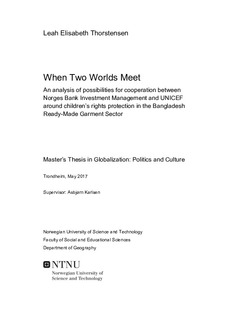| dc.contributor.advisor | Karlsen, Asbjørn | |
| dc.contributor.author | Thorstensen, Leah Elisabeth | |
| dc.date.accessioned | 2018-07-31T08:37:41Z | |
| dc.date.available | 2018-07-31T08:37:41Z | |
| dc.date.issued | 2017 | |
| dc.identifier.uri | http://hdl.handle.net/11250/2506934 | |
| dc.description.abstract | The United Nations Sustainable Development Goals (SDG) implemented in 2015 present a comprehensive normative framework for global and national actors in politics, civil society and business. As the SDGs underline the importance of partnerships in achieving the goals, particularly for the corporate and financial sector, this thesis examines how a large financial investor as the Norges Bank Investment Management (NBIM) and an intergovernmental organization as the United Nations Children’s Fund (UNICEF) could collaborate in engaging companies on children’s rights. As to limit the scope, the focus is drawn to the Bangladesh ready-made garment (RMG) sector. Both NBIM and UNICEF currently involve with major global apparel companies and brands directly and indirectly linked to the Bangladesh RMG sector through corporate ownerships (NBIM) and corporate partnerships (UNICEF). In this context, the thesis investigates the possibilities for cooperation for NBIM and UNICEF in child rights protection. This thesis employs the theoretical frameworks of global production networks (GPNs) as presented by Dicken (2015), corporate social responsibility (CSR) and multistakeholder collaboration towards a qualitative study of the organizations’ own perceptions and practices on children’s rights and cooperation with external actors. During the research process, some important findings emerge. Applying a context-specific view on CSR (Dahlsrud, 2008), this thesis contributes with concrete recommendations for NBIM and UNICEF in their future engagement with companies in the Bangladesh RMG sector through a context-specific multistakeholder approach. Furthermore, UNICEF and NBIM hold various albeit complementary roles in the global economy towards engaging companies on children’s rights. As such, this thesis addresses the need for a conceptual widening of the GPN theory in terms of including ‘hybrid’ actors like NBIM and UNICEF. Finally, the thesis presents areas of future research on cooperation between financial institutions and (intergovernmental) organizations through a wider GPN framework. | nb_NO |
| dc.language.iso | eng | nb_NO |
| dc.publisher | NTNU | nb_NO |
| dc.subject | corporate social responsibility | nb_NO |
| dc.subject | children’s rights | nb_NO |
| dc.subject | UNICEF | nb_NO |
| dc.subject | NBIM | nb_NO |
| dc.subject | multistakeholder collaboration | nb_NO |
| dc.subject | global production networks | nb_NO |
| dc.title | When two worlds meet : an analysis of possibilities for cooperation between Norges Bank Investment Management and UNICEF around children’s rights protection in the Bangladesh ready-made garment sector | nb_NO |
| dc.type | Master thesis | nb_NO |
| dc.subject.nsi | VDP::Samfunnsvitenskap: 200::Samfunnsgeografi: 290 | nb_NO |
